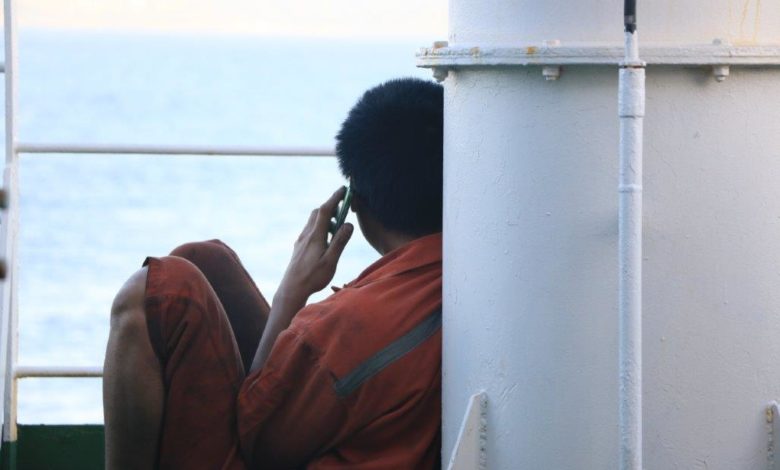You are here
Finding it hard to talk
Finding it hard to talk
October 24, 2023 https://splash247.com/finding-it-hard-to-talk/
Steven Jones, founder of the Seafarers Happiness Index, on the worrying trend among seafarers who are finding it hard to properly talk with each other.
One of the common threads of the Seafarers Happiness Index has long been the strength of the bonds between those at sea. Over the years, crews have spoken at length about the importance of camaraderie, friendships, mentoring and the helping hand of interactions to get them through tough times.
This makes perfect sense, and all workplaces rest on such positives regardless of ship or shore. It is people that make a difference. Unfortunately, though, it seems that there is an increasingly difficult barrier to overcome at sea.
In our most recent set of responses, seafarers said that they were finding it ever more difficult to talk to each other. Not just because of the challenges of social cohesion or lack thereof, we are hearing that across generational and cultural divides a worrying relationship chasm is developing.
The changing demographics of seagoing mean it can be hard for seafarers to find a common tone to communicate. In the past, jokes and shared understandings were the foundation. This is no longer the case, and the erosion of the ability or opportunity to talk, laugh, share, to teach and reach out massively damages “team camaraderie”.
Contact and conversation poverty is real
This in the past encompassed the sense of mutual trust and friendship, that often develops among team members, but is now ever more difficult to achieve. It is not just the death of “banter”, an eroded communications skill set makes everything more challenging and can bring with it potential problems. This is where we see arguments and miscommunication, which can lead to stress and even accidents.
We seemingly have an oracy deficit. Now, we’re not talking about the ability to debate at the Oxford Union, but just the ways and means of engaging effectively with others. Oracy skills are fundamental to communication, learning and social participation. They allow for the building of strong, positive relationships.
Having these skills allows us to articulate thoughts, feelings, ideas and opinions effectively so others can understand us better. This builds mutual understanding. Good oracy helps you listen attentively to what others say, pick up on verbal and non-verbal cues, and respond thoughtfully and sensitively. This builds empathy and strengthens bonds.
Increasingly important onboard, these skills enable constructive discussion of disagreements. Especially important as there is a real concern that in failing to communicate properly, any problems become magnified and can wreck team dynamics.
Without the ability to explain perspectives diplomatically and consider others’ points respectfully conflict can all too easily develop. Positive influence comes from the skilful use of persuasive language, anecdotes, passion and emphasis. You cannot lead effectively if you cannot communicate well.
There is real concern that management and senior leadership teams at sea are losing the skills they need to get not just the best performance, but good relationships too. Or they are caught in the traps of what they perceive is needed.
Captains often speak of the “immense responsibility” they feel for everyone onboard and for ensuring the success of each voyage. This naturally breeds a stoic approach, as they seek to remain calm, focused, and decisive when making tough calls.
A sense of emotional detachment and reserve develops, and the fear that if senior leaders express doubts or uncertainties openly then it could undermine the crew’s confidence. Though, of course, it is not easy. There are times when stress, anxiety, sadness or fatigue weigh heavily, but seafarers feel they cannot let it show, that they have to “be strong”.
Without outlets for stress relief or the ability to open up to a support network, other captains, counsellors or loved ones. then this can become a ticking emotional timebomb.
Talking helps build rapport, something which is so important on a ship It helps the bonds of cohesion and team building. The ability to find common ground by exchanging ideas creates a sense of connection.
Oracy empowers compassionate, mindful and ethical relating. It allows for bonds to develop, which in turn can allow the sharing of inner thoughts, emotions and experiences. The tools to self-disclose can be so important in helping people cope, something which is even more important when away from family and support networks.
As they say, a problem shared is one halved. Which makes this issue doubly important. Where seafarers feel isolated, lonely and ignored, where they cannot talk about the challenges they may be experiencing, then this is a recipe for mental health disaster.
The industry must find ways and means of helping seafarers communicate effectively with each other, “ora-sea” as it were. If we don’t, the pressure cooker of stresses can become too much to bear. If we don’t then isolation turns to loneliness, turns to despair.
We need to recognise that contact and conversation poverty is real and that addressing the problems is vital, rebuilding relationships and outlets, and that starts with talking.

